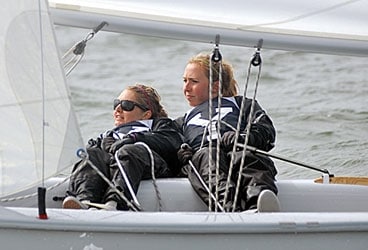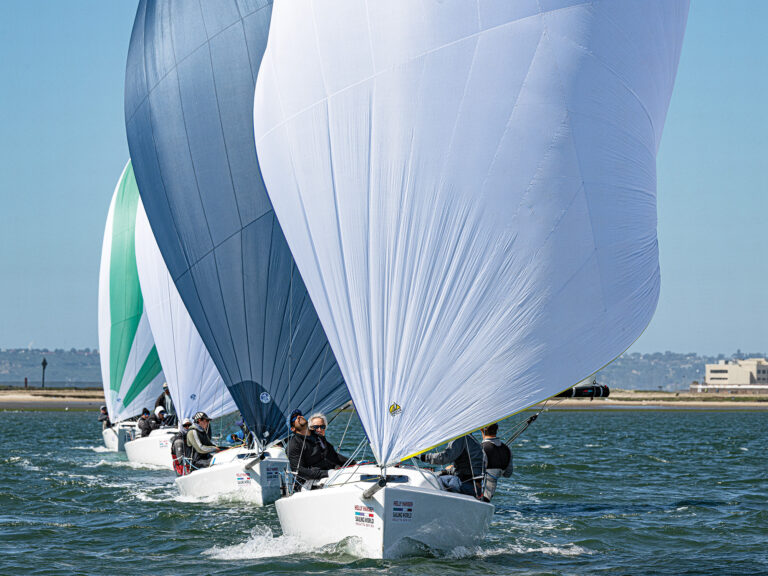
Being underweight, Jane Macky and crew Marla Menninger had to hike extra hard to stay ahead of the pack at the recent ICSA Women’s Championship in San Francisco.
After finishing 18th in one early race of the InterCollegiate Sailing Association Women’s Championship, Yale senior Jane Macky and crew Marla Menninger recalibrated their focus.
“We looked at each other and were like, ‘OK, let’s go out and win this next race,'” she says. “It was really windy and all day we hadn’t truly turned our game on 100-percent. We had everything ready to go and off the start we blew away from the fleet, hiked our asses off, and were beating all these bigger girls that had been beating us all day.”
And so it was in this fashion that Yale senior and women’s Bulldog A-division skipper Jane Macky ripped it up in the remaining races of the Women’s Championship in San Francisco. Sheer determination and love of sailing earned the New Zealand native an impressive first place in A division and Yale’s ultimate victory. The outstanding performance also sealed the two-time All-American’s fate as the Quantum Female Sailor of the Year.
Being from New Zealand, what made you decide to come to the United States?
I had heard about college sailing while in Canada for the Cork Regatta when I was 16. I think that’s the way to do university and sailing at the same time, which isn’t as easy to do in New Zealand. Back at home, if you want to be serious about sailing you give up university and train for the Olympics straightaway. So college sailing really sparked my interest and sounded like a lot of fun. When I got in to Yale, I was like, “Well I have to go now!”
Did you do anything special to prepare for Nationals?
I’ve been with my crew Marla for the last two years. We know each other well and have built up a really good sailing relationship. She knows the strategy that I execute on the water and after two years understands everything. Even though this year was a very good year for us, at a lot of regattas we would be doing really well, make one big mistake, and end up not doing as well in the regatta. So we worked on performing the way we knew we could every time. Also, we knew that it was supposed to be really windy and we didn’t have different crew options for me, so we had to get a little stronger to survive out here.
How does the communication work in your boat?
At this point it’s actually really cool because there’s not a lot of new talk. I talk a lot when we are sailing, but it is all the same sort of stuff, like talking about where the fleet is, how we want to finish, balancing, and not taking too much risk on the fleet. It is funny because I feel like Marla can tell if I am doing something out of the ordinary – she knows right away and can sort of say, “You know, the fleet is splitting to the other side,” which is something we normally take into account.
How did you tackle the challenges of racing in San Francisco?
Marla and I had a similar approach in that we knew that if we put in all the hard work before the regatta, we could go out there and have fun. Since this was my last regatta in college sailing, I just wanted to enjoy the whole thing. I made a big boathandling mistake on the last set of the first day. After that I was really upset, but that was something we had to put behind us. I knew there were a lot more races and I needed to keep working hard and having fun with it.
What are your starts like?
Our starts were actually really good. The start for me is a lot about confidence. I can get quite standoffish and Marla is really good about reminding me that we can start anywhere we want and just go for it. This year, we’ve worked a lot on our starts because I think we have the tools to do well in any conditions and executing well on the start is important for making that happen. This year, we’ve become more risky with our starts and more comfortable with going in and trying to win races, as opposed to last year at Nationals when we never won a race. We were very conservative and finished with a bunch of fourth places. We took more risks this year, which was a lot more fun because we got to win six out of fourteen races.
Any crazy moments for you and Marla during Nationals?
On the last bit of the first day, when we got our 18th, we were third around the top mark and our speed downwind was incredible compared to our fleet. We practice at Yale in waves and breeze downwind, so we are really comfortable with it and have fun. We were coming in to the bottom mark first. When we jibed, we spun out because we didn’t have enough vang on and the whole boat filled up with water. It was devastating. We decided to bail, though looking back on it, it probably would have been faster to capsize because there was a lot of water. After that race, we looked at each other and were like, okay let’s go out and win this next race! If we got a first and an 18th that would be like a 10th and a ninth which aren’t such bad scores. So the next start, we totally went for it. One of our team members thought that if we hadn’t had that 18th place, we would have never turned on our game like that for the rest of the regatta. Maybe we would have still won, but we would have been fourth place in a lot of races like last year instead of going out there and just winning.
Your game was certainly on going into the last set when the points were close between Yale, Charleston, and Old Dominion in A division and overall. Old Dominion had a fifteen point lead. You then proceeded to dominate the last set with two first places. What was your game plan?
I knew we were close and we were confident because we had been sailing really well all day. Right after the 18th place on the first day, we just got really tuned in, had a good sense of the shifts, and knew we could start anywhere as long as we were in clear air and not being pinched off. That would kill us so much because we are a little bit lighter. We needed to be free and going. Things just sort of came really easily. I know we looked back at the end of that first race when we won by quite a bit and we were saying to each other, “Wow, where’s Charleston?” and thought they were a bit back, and “Wow, where’s ODU?” and they were still coming around the top mark. At that point we were like, “Okay, we just need to do this again and we’ll be fine.” We didn’t really know though because we never looked at the scores too much. I’m of the mind that I just want to go out and sail. We have all the skills and the ability, we just need to sail our races and whatever happens to them happens to them. We had already had an 18th place. They could have an 18th place too, and if they don’t, then they had beaten us, and good for them.
For the last race of the day, did you sail conservatively or take more risks?
It was actually interesting because it got a little lighter and so we had a little bit more of a fleet advantage. The wind shifted a little bit and I thought they had let the chain out on the boat end of the line. That’s where we had been starting the last couple of races and it had been working really well. Should we start at the boat again, because we know we can do it and it is a conservative thing to do, or should we move down to the pin, because it is favored and I know we can win if we win the pin? We knew we could do it, so we headed down to the pin. We had faith, went for it, and starting from the pin we were off.
How does it feel to be two-time all-American and Quantum Sailor of the Year?
It is very exciting. I wish that Marla had the same title because honestly, we’ve learned so much together and I don’t think I could have done it with anyone else. She’s such a fantastic crew. Anyway, it was a great way to end my career. It’s been an incredible experience.
Did you always have this goal?
I’ve always loved sailing and before I came to college, I’d only sailed singlehandeds, so it was a massive learning experience to figure out how to sail Club 420’s and FJ’s. Junior year, I was getting stressed out about results and my coach told me that I was doing great. He was like, “Did you ever think you’d be in the running for Quantum Sailor of the Year?” Then, I knew that I could do it. It’s been really fun getting to a point where we’re consistent and at the level where every time we go out, we have the same strategy – a winning strategy. It’s not that we win every time, but we have a lot of fun when we’re at the top and we are competing for first every time.
What is your favorite college sailing memory?
We had our whole team out here in San Francisco and the last day of the regatta, the current was working in such a way that it was really favored for us to tack in to the shore a lot. The last day was fantastic. We had our whole team running up and down the sidelines, cheering for us. I think our team is quite understated. We obviously support each other a lot, but our team doesn’t usually cheer – we normally think we are a bit too cool for it all or something. Coming up to the shore, everyone would be screaming for us, and it was so cool. We were hiking and we would hike harder when people were yelling for us. I love our team. We have great people and we have so much fun. This is something I’ll never forget.
Any big sailing plans for the near future?
I’ve actually been focused on Nationals for so long that I think I’ll have to go back to New Haven after this and figure out my next move. The only thing I’ve got planned for the summer so far is V15 Nationals. I definitely would be devastated to never sail competitively again. I’m still considering Olympic opportunities. Even though the schoolwork was really interesting, college sailing was my number one thing at Yale.









